Today I have something really special for you. Next week, on March 8th, is International Women’s Day and today, we’re marking the occasion by celebrating the work of some extraordinary women working in food today.
Last year it was all about layer cakes. This year I’m pinching-myself-level-thrilled at what I’ve got in store for you; I reached out to some of my favourite cookbook authors to ask them all about recipe development. These women have all authored books that I use time and time again, books that have demystified dough or taught me how to judge a wobble. These are books that both comfort and thrill me, books that have really made me the baker I am today!
Though I’m sure you’ll already be familiar with all of these, I’m thrilled to (re)introduce you to Dorie Greenspan the award-winning author of 14 books, Helen Goh co-author of ‘Sweet’, two time author Yossy Arefi of ‘Snacking Cakes’, my favourite preserver Camilla Wynne of ‘Jam Bake’ and ‘Preservation Society Home Preserves’ and Liz Prueitt, co-founder and author of ‘Tartine’ and ‘Tartine All Day’. *faints*.
I feel so lucky to have captured a little insight into their recipe development worlds to share with you today. And a little parting advice from me: Whenever I find a cookbook I love, I try to cook as much as I possibly can from it - I find that authors, chefs and writers often have bigger lessons to teach than is possible through just one recipe. You may not notice it at first, but something exciting is happening - though it may be imperceptible to you in the moment, you will begin stitching together those sometimes invisible threads. Allow yourself to follow the breadcrumb trail left for you by the author, and you’ll often be rewarded with extra lessons you don’t even realise you’ve learned. Ok, let’s get into it!
On KP+ today
Over on KP+ today, I’m sharing the recipe for the glorious Mimosa cake, a blooming sponge cake with layers of custard and sharp lemon curd. Mimosa flowers represent International Women’s Day in Italy and this cake is a lovely way to mark the occasion:
Dorie Greenspan
Dorie Greenspan has been writing game changing cookbooks for three decades. Her attention to technique and discerning eye (and palette) means that every single title of hers is a gem - and there are FOURTEEN of them. From her long-time collaborations with Pierre Herme (one of the first cookbooks I ever bought myself) to her weekly newsletter ‘xoxo Dorie’ check-ins, it’s really no surprise she’s one of the most decorated authors ever (FIVE James Beard Awards!).
Writing a book is such a huge undertaking. What’s your approach to recipe development? How do you keep track of your ideas?
Sadly, I have a very haphazard way of working on books. Often, I don’t start with a recipe outline or wish-list (in my next life, I will – it’s really the right way to do things) and even when I’ve had lists, I can’t remember ever following them precisely. Of course I start with an idea of what the project will be, but sometimes I don’t know what shape the book will take until it already has it. I remember that as the deadline for Baking Chez Moi approached (hooray for deadlines – without them, I’d just keep going), I wasn’t sure that I had a book, and I was uncertain about how the recipes would fall into chapters. My recipe tester and I wrote the name of every recipe on strips of her kids’ colored construction paper and then dealt them out into chapters like playing cards. Every time I finish testing and writing, and it turns out that I’ve made a book, I’m amazed. This is really not the best way to work, certainly not the least nerve-wracking, but so far it’s been ok. I’ve been very lucky to have long lead times and extraordinarily understanding editors, and so I’ve been able to create recipes on whim and inspiration.
As for keeping track of ideas – thank goodness for notebooks. Post-its, too. I keep all my testing notes in a notebook. When I think that something’s good, I mark the page with three stars (usually in purple). And then, when I’ve written the recipe and it’s ready to go to my tester, I put a big checkmark on the page. After that, everything else is digital.
Do you have a baking philosophy?
No one’s ever asked me that question and I don’t think I’ve ever thought about it. “Philosophy” seems like such a big and important word. It’s not the same, I know, but I do have a goal when I’m developing recipes – I want everyone who makes the recipe to be successful. When I’m developing a recipe, and then again when I’m writing it, I try to anticipate a baker’s questions, point out the moments when something might not look right, and encourage and cheer the baker on. Even after all these years, I get excited when I pull something out of the oven, and I get really excited when something new works the way I’d hoped it would – I want others to have these same experiences. I always write with the first-timer baker in mind, hoping to convert her into a lifetime baker.
Do you have a comfort ingredient you tend to lean on when developing recipes?
Oh, gosh – I think I have a bunch of them. When I wrote Everyday Dorie, my editor thought I’d written a tomato book. In Baking with Dorie, there were so many blueberry and cranberry recipes. Early on, I would have said that chocolate was the ingredient I always turned to. I’m still in love with chocolate – a lifelong fan of dark chocolate, I’ve even come to embrace milk chocolate (it’s such a good balancer in recipes and a good bridge between sweet and acidic) – but I’ve gone over to the light side and now use vanilla often and with exuberance. Also, lemon and almonds. I don’t know what I’d do in the kitchen without citrus and nuts.
What was your hardest-earned recipe? Are there any particularly memorable ones that took a long time to get right?
Macarons! The first time I tried to make them was when I was writing Chocolate Desserts by Pierre Hermé (2001). The recipe came from Pierre, and it was, like all of his recipes, solid. Still, I must have made the macarons a dozen times before getting them right. After that, I swore I’d never make them again. In fact, when I wrote Paris Sweets (2002), I said that macarons were not a pastry to make at home and told everyone to go out and buy them.
Years later, with the internet in our lives, I saw hundreds of home bakers making beautiful maracons. Many of the bakers claimed they’d never baked anything before! Still, I was unmoved in my commitment to stay away from baking them at home. But as I was wrapping up the manuscript for Baking Chez Moi (2014), which was about French-inspired sweets, my editor and I agreed that even though I’d never met a French person who’d made macarons at home, I had to have a recipe. It wasn’t any easier for me the second time around, but according to what bakers have told me, it’s a good recipe. Moi? I still don’t make them at home!
By the way, cannelés were tough, too.
What’s your hero flavour combination?
Once again, another hard question and one I haven’t thought about before. I’m not sure I have a special combo. When I’m developing a recipe, I always try to build a little surprise into it. Often, I’ll tuck something a little savory into a sweet. Maybe it’ll be an herb that I rub into the sugar; maybe a spice. Sometimes, it’s something strong, like star anise or sumac; sometimes a background spice like coriander; and sometimes a combination, like ginger and cardamom, which together seem to have the power to bring mystery to even the plainest cakes.
When I began working with Pierre Hermé in the mid 1990s, fleur de sel was one of his hero ingredients. He added more salt to desserts than most of us were accustomed to at the time and he told me: Salt in sweets is the same as salt in savory foods: it’s a seasoning that brings out the flavor of other ingredients. Today, that seems like a commonplace – we sprinkle salt on so many sweet things now! – but it was revelatory then. And it’s still important, so salt is almost always a part of my desserts, especially when the dessert is buttery or based on caramel or chocolate.
Is there anything you wish you’d known before writing your first book?
My first book was published in 1991 (!!!). I was very shy (I was the kid who never raised her hand in class) and very happy to have found work that I loved that I could do at home. I was happy to develop recipes and share my tests with family and friends. I was happy that my kitchen was my office. No one ever told me that as much work as I did to create the book, that’s how much work I’d have to do to get the book into the world. And in those days, other than a telephone interview with a reporter (not that I got many of those), you had to be out and about. Promoting didn’t come easily to me – it seemed impolite – and knowing about it ahead of time wouldn’t have changed it, but I wish someone had helped me understand the arc of publication earlier in the process. All of this sounds so quaint now, doesn’t it?
When people read your book(s), what’s the one lesson you really hope they’ll take away from it?
JOY! And the desire to bake more and share more.
If you could only have one dessert for the rest of your life, what would it be?
Ice cream. May I have some bitter chocolate sauce too? Please.
Helen Goh
When I worked at Ottolenghi I was lucky enough to get to know Helen Goh’s recipes up close and personal. The techniques and flavours in those recipes have been fundamental to my baking repetoire and have been a real foundation for understanding how to put recipes together. As well as being the lead recipe developer for the sweet side of Ottolenghi, she co-authored ‘Sweet’ in 2017 and has a bi-weekly column in the Sydney Morning Herald.
What’s your approach to recipe development? How do you keep track of your ideas?
Hmm I have a slightly different approach depending on the brief. For example, for my weekly baking column in the Sydney Morning Herald, I am led by ingredients and seasons, and also special events in the calendar which may have traditional symbolic cakes and pastries to commemorate the day. For the latter, I may start by looking at the ingredients in a classic recipe, say coconut, oats and golden syrup in Anzac biscuits, then transpose them into a different form like a loaf cake or bars.
For Sweet, the brief was just to bake ‘what you love’. So the starting point for that was fresh fruit as I grew up in Malaysia where fruit was often the only dessert or pudding. But of course I also love chocolate, caramel, cream, buttery goods and nuts. It wasn’t until towards the end of the recipe testing process did we find that the chapters formed themselves quite organically into small cakes, large cakes, cookies, confectionery, cheesecakes etc etc.
Do you have a baking philosophy?
My baking philosophy is really an extension of my life philosophy, which is that it has to flow. I am very sensitive to something not flowing and I don’t like forcing things. In terms of recipe development, I veer towards classic pairings with ingredients and dislike flavours that taste like they have been forced together to show how clever the cook is. It might seem clever but if it makes me feel like it is hard work eating it, then I don’t. For me, baking is about comfort and delight, though I appreciate the artistry of those who create very sophisticated or original pastries and cakes. What is interesting about working at Ottolenghi is that the brand is synonymous with the unexpected, so Sweet had to have elements of this and we found subtle ways to incorporate the element of surprise without being gratuitous.
Do you have a comfort ingredient you tend to lean on when developing recipes?
I love sour cream or creme fraiche for its tenderising effect on pastries and cakes. It adds great flavour and richness and because the fat shortens the gluten strands, you get a softer, buttery-er crumb. I also love alcohol in cakes - it adds a bitter distilled flavour which cuts the sweetness and adds a little mystery to a bake.
What was your hardest-earned recipe? Are there any particularly memorable ones that took a long time to get right?
I have a 3-strikes-and-out rule. That’s not to say that I have to nail a recipe in 3 attempts but I need to feel that it is taking shape by the third test, otherwise I let it go. I often find the simplest recipes hardest to get right. The Powder Puffs in Sweet for example starts off as a simple sponge biscuit, made with a just few ingredients but it took many trials to get it right. I could make it work, but because my first experience of eating it was an ethereally light version made by an elderly lady (at a wake!) I wasn’t satisfied til I got that exact texture.
At the end, it was the technique - not unlike the process of macarons - where the folding of the batter had to stop at the moment when the batter cascades in thick ribbons. Over-folding breaks down the beaten egg whites, resulting in a thin, watery batter and biscuits that are full of air bubbles and lose their shape in the oven. When they are sandwiched together with the Chantilly cream, the biscuits should soften gradually over time. But if the biscuits have spread too much and are full of air bubbles, they go soggy rather than yield gently to the moisture in the cream. Its a delicate balance but makes the difference between a sublime eating experience and an ordinary good one.
What’s your hero flavour combination?
From my childhood, the combination of pandan, coconut and salt evokes a nostalgic taste that I find irresistible. I use it a lot at home when cooking for family and friends but not so much in my recipes for publication as I only like using the freshly extracted juice from pandan leaves, and I know this is not always accessible for readers. Ps. You can find fresh pandan leaves in Asian supermarkets - freeze them when you get home. I extract the juice using my Oscar masticating juicer but you can also use a blender with a little coconut milk, then straining the fibrous leaves out.
I also LOVE the flavour of Cafe de Olla - the combination of coffee, vanilla, cinnamon and dark brown sugar. I flavour biscuits, pannacotta, cakes and syrups with it. It’s bitter, sweet and spicy.
Is there anything you wish you’d known before writing your first book?
When a recipe didn’t behave and I was having a bad day for whatever reason, I could sometimes go down the rabbit hole of feeling like I’d made the wrong decision in writing a book. When actually, it is just bloody arduous work to try and get something just right and then to communicate it clearly in a recipe so that readers can get it just right too. I wished I had been more aware that this cycle is part of the creative process and is experienced by nearly everyone rather than as a sign of failure or inexperience on my part.
When people read your book, what’s the one lesson you really hope they’ll take away from it?
We agonised a bit for Sweet, to find the balance between giving information for success but not so much that readers feel overwhelmed and intimidated. The length of a recipe can sometimes be mistaken for complexity, but the notes are there to make things easier, not harder. The boring bits like making sure the ingredients are at room temperature, or taking time to line a tin properly can make all the difference. I used to be very impatient with the mise en place and rushed through them to get them out of the way, but now I have learnt to enjoy the whole process, from choosing the ingredients, weighing them out carefully to painstakingly greasing an elaborate bundt tin. Enjoy the process, it’s a beautiful form of therapy and meditation!
If you could only have one dessert for the rest of your life, what would it be?
That’s easy - it would be creme caramel.
Yossy Arefi
Yossy Arefi is a photographer, recipe developer and baker based in Brooklyn. She has authored two books, ‘Sweeter On The Vine’ a celebration of fruits through baking and ‘Snacking Cakes’ a smash-hit booked stuffed with straight forward one-bowl cake recipes that I completely fell in love with. If you’re not familiar, ‘Snacking cakes’ are single layer cakes which only have one requirement: Be very simple to make. It’s the kind of book that could make even the most kitchen avoidant person fall in love with baking, one of those rare ‘game changers’.
What’s your approach to recipe development? How do you keep track of your ideas?
When I am brainstorming for a book I open up a google doc and make a huge list of all of the flavor combinations and types of bakes I'd like to include. Some are super general and some are very specific ideas I've had kicking around for a while. I also use the Notes app on my phone if I am out and about and have an idea I don't want to lose. With books, I usually have a general framework that I am working within which helps streamline the process from there. My first book Sweeter off the Vine was all about fruit desserts so I had a list of all of the fruits that I wanted to include and a list of all of the techniques I wanted to include and I matched them up until it felt like a good balance. Snacking Cakes was so fun because I just made a huge list of all of the flavors that sounded good together, then tried to work them into a cake without repeating any combinations. I also had a personal goal with Snacking Cakes that all of the cakes looked different because simple cakes are usually pretty brown and I wanted the book to be fun to photograph (and look great)!
When it comes to actually developing the recipes I am a big pen and paper person. I start a new notebook for every big project and bring it into the kitchen with me so I don't have to worry about it getting splattered and stained. Then at the end of each day or a few times a week, when a recipe feels "done," I will transcribe my notes into a google doc and either send it off to be tested by someone or sometimes I will sit on it for awhile, test again myself, then send it off to a tester.
Do you have a baking philosophy?
I try really hard not to take it too seriously. Baking should be fun and/or a stress reliever! The worst thing that could happen is that you mess something up and it doesn't taste great, but you probably learned something from that process, and that's valuable too. Lately, I have been really focused on how to take recipes that seem tricky and streamline them. What steps are really necessary here? If I do them in a slightly different order or with fewer utensils, can I still get the same, great result? Recently I was trying so hard to make a souffle cake without separating the eggs, but I never got it to work the way I wanted it to, so it doesn't always work! Sometimes you really do have to whip those egg whites separately.
Do you have a comfort ingredient you tend to lean on when developing recipes? (e.g. Mine is pistachio in all its forms - I have to keep myself in check otherwise, I’d end up using them in every single recipe!)
I love pistachios too! I went through a phase where I was adding citrus to every fruit dessert I made, and finally had to cut myself off. I really strive for balance in desserts so you can really taste all of the ingredients, the biggest compliment someone can give me is that something isn't too sweet.
What was your hardest-earned recipe? Are there any particularly memorable ones that took a long time to get right?
I think the "simple" recipes are the hardest. I have made so many chocolate chip cookies and brownies in search of the perfect version. The truth is, perfection is totally subjective! You are never going to please everyone. Some people like crisp thin cookies and some people like big doughy ones. They are all perfect to someone.
What’s your hero flavour combination?
Citrus and poppyseeds!
Is there anything you wish you’d known before writing your first book? Yes, so much! I wish I had known how long and slow the process can be, and how many rounds of editing a book goes through. Also, it is so important to go in with a really strong vision of what you want to achieve. There are so many people involved in making a book, and you won't even meet or have contact with all of them so it's really key to keep your vision front of mind and make sure that every step of the way you are working towards it.
When people read your books, what’s the one lesson you really hope they’ll take away from it?
That baking can be challenging and take a lot of time and patience, but it can also be really fun and easy. Bakes that take less than an hour can be just as satisfying and delicious as something that takes 2 days to make. They all have their place!
If you could only have one dessert for the rest of your life, what would it be?
Oh such an impossible question, but right now my answer is hot fudge sundaes. I just wrote a recipe for Peanut Butter Hot Fudge and it is one of my favorite recipes ever. So quick, easy and good.
Camilla Wynne
What Camilla Wynne doesn’t know about preserving is just not worth knowing. One of Canada’s only master preservers, Camilla is the award winning author of two books ‘Jam Bake’ and ‘Preservation Society Home Preserves’ with a third, ‘Nature’s Candy’, on the way. I know you guys are already pretty familiar with her since earlier last year I somehow managed to persuade her to be our preserving columnist here at Kitchen Projects. Since getting my copy of ‘Jam Bake’ in 2021, my preserving has gone from once a year to once a month!
What’s your approach to recipe development? How do you keep track of your ideas?
I start a new notebook for every book I write. I'm old school--no Excel spreadsheets or anything else a highly organized person might use. For Jam Bake and the current book I'm finishing up, I wrote a proposal first, so I've gone in with a table of contents (developed usually after much note-taking on my phone as the idea takes shape). So I refer back to that, though it will inevitably change a bit. I do wish I would take better notes during development. Often I'll just jump in and not even write the recipe title at the top, so there's sometimes a bit of decoding to do after the fact.
Do you have a baking philosophy?
I'm not sure that I do. But I must! I know that in terms of book-writing, what I like is to teach a technique and to teach it in such a way that people can really take it and make it their own. As far as baking goes, I'm just always writing recipes for things I want to eat! And my tastes are quite broad. I also care about high-quality ingredients but never to the point that they'll break the bank. You can make something delicious cheaply, but there are ingredients it really pays to invest in, like chocolate. I also love creating recipes for classic flavors in different guises, like Black Forest jam or stollen pound cake. It's just a fun little perspective switch, probably a holdover from my time enamored with molecular gastronomy.
Do you have a comfort ingredient you tend to lean on when developing recipes?
Vanilla bean! I'm getting better at using it judiciously out of necessity now that it's so expensive, but I would put it in everything if I could.
What was your hardest-earned recipe? Are there any particularly memorable ones that took a long time to get right?
I think I'm still in the midst of it at the moment! I am desperately trying to coax candied limes into tender submission. For some reason they just stay really tough, so I've got all the big guns out-- soaking, baking soda, gradual sugar density increase... Wish me luck!
What’s your hero flavour combination?
A difficult question, but definitely citrus and star anise is one of my signature combos. It stems from a youthful love of tiger tail ice cream (orange & licorice flavour!), and I've turned it into marmalade, pound cake, sablés and raspberry jam.
Is there anything you wish you’d known before writing your first book?
Oh my gosh, everything! I wrote my first book in 2013 after being approached by an editor who'd seen a spread of my recipes in the newspaper. We sketched the outline over lunch, I found out it was approved a few weeks later while on vacation, and that I had 2 months to write it. It was a herculean task, but I was just so happy for a long-held dream to come true that it never occurred to me that I could ask for more time (or more money). It's only now, on my third book, that I'm working with an agent-- I highly recommend taking one on to help advocate for you and navigate the process, especially for a first book. Even without, though, I have now learned that I can push back and stand firmer for the editorial and art decisions that I feel strongly about. After all, it is my name going on the cover.
When people read your book, what’s the one lesson you really hope they’ll take away from it?
I think for me the most important thing I want people to take away is not to be discouraged by first attempts that don't turn out exactly as envisioned. Almost anything worth doing takes practice! Not only that, but there's joy (and deliciousness) to be found in that repetition, the honing of a skill. A recipe provides a formula and technique, but experience is ultimately what's most important. And once you get it, that's when you get the big prize of being able to be more creative.
If you could only have one dessert for the rest of your life, what would it be?
That's a horrible question, Nicola! Don't make me pick! What jumps immediately to mind, though, is baba au rhum, but that's probably because I just came home from Paris without eating one there.
Liz Prueitt
There is a reason that Tartine is everyone’s favourite bakery, and award-winning writer, chef and entrepreneur Liz Prueitt is definitely responsible. She co-founded the world famous (but SF-based) bakery in 2002 and her bakes are well within the iconic tier. Both of her books, ‘Tartine All Day’ and the co-authored ‘Tartine’ are among my most loved, they are enduring classics with recipes that you will use again and again and again - Tartine is more focused on bakery life whilst Tartine All Day translates the freshness and dynamism of a bakery to suit home cooking. Liz is currently working on her next book which will have a focus on gluten-free baking (in a twist of irony, she is actually gluten-intolerant!)
What’s your approach to recipe development? How do you keep track of your ideas?
I usually start with a general idea of what I want in each chapter, for instance single layer, cakes, tray bakes, small cakes, etc. And then I’ll generally try to just drop down every idea I have without editing myself too much to begin with: Pastries that I’ve been wanting to make for a long time, pastries that might be challenging to do gluten-free, and I’ll have a new idea of a way to work out a recipe where I might not have been able to figure it out previously.
Then I’ll get an idea of how long I want the book to be i.e. how many recipes and start editing down, keeping an eye on how many of each type of recipe I have. Chocolate, fruit, creamy, desserts, etc. As I’m cutting recipes, I’ll put them into a new document for ideas for a future book or to swap out for a recipe that might not be working the way I want it to in the first document.
I’ll also organise by cake bases for instance, a gluten-free genoise, chiffon, joconde, a dark chocolate cake layer, a jelly roll layer and from here, I’ll build.
Do you have a baking philosophy?
In general, I like using natural ingredients. For instance, if I making a red velvet cake, I’ll look for a way to make it naturally red. I also like to keep sweetness to a minimum as far as it makes sense for the recipe and, generally, my favourite decoration is flowers, which is some thing I started back when we had a small bakery in Millvalley in 2000. When we moved to San Francisco, a woman who had a plot in a community garden brought me flowers several days a week and beautiful cottage roses. I like clean simple flavours and if there are combinations I like them to be distinct.
Do you have a comfort ingredient you tend to lean on when developing recipes?
I tend to prefer fruit, desserts, and cakes and pastries. I also love to make cake bases with almond flour, although I have to remember that there are many people with nut allergies so with my current book I’m working on some cake some cake bases without almonds. I just love the toothsomeness that almond cake bases have, and you generally don’t have to add extra oil or butter to the recipe since almonds have so much oil on their own. I’m more tend to get into ruts - like if I’m working on a cheesecake recipe, I want to make all the cheesecakes! Italian cheesecakes, Polish, cheesecakes, figure out how to make the cheese for the various cakes, different types of crusts, toppings, I guess you could say I love a sweet cheese dessert!
What was your hardest-earned recipe? Are there any particularly memorable ones that took a long time to get right?
I was working on a chocolate cake recipe, and was having a hard time finding a balance that I liked. It took a lot of tries, but one of the experiments I used was chocolate and almond together, and cut down on the butter. It created the perfect deep, chocolatey flavor with a beautiful texture that I was looking for. These are the chocolate cupcakes that we make at Tartine Manufactory right now. We just top them with freshly whipped cream.
What’s your hero flavour combination?
Maybe it’s because of the unusually cold weather we’re having right now, but I’ve been marinating prunes in Armagnac, and using them and everything; solo with some whipped cream, and the syrup from the soaked prunes, in a Far Breton, and in chocolate cake.
Is there anything you wish you’d known before writing your first book?
Yes! To accommodate the way different people bake, I always have included grams, cups, and ounces. This presents a lot of obstacles when your weight is different from one of your recipe, testers weights, and is different from the copy editor’s, weight/cup chart.
For my next book, I’m starting in grams and letting cups in ounces follow. I wish home bakers would all just switch to grams, especially for gluten-free baking. I feel like it’s imperative for the success of recipes for baked goods, but a lot of people have a mental block against using skills. Once you make the switch, though, you realize how quick and easy it is to use a scale as opposed to cups, how much more accurate it is, and you dirty fewer mixing bowls.
When people read your books, what’s the one lesson you really hope they’ll take away from it?
That’s easy! To use a scale! Ha ha just kidding. I hope people will see, that once you master some cake bases, learn how to make a simple jam for filling, and some good frostings, how easy it is to come up with your own cakes. There really is no need for much more!
If you could only have one dessert for the rest of your life, what would it be?
A perfectly ripe peach. If it had to be a baked dessert? Any type of fruit Galette.



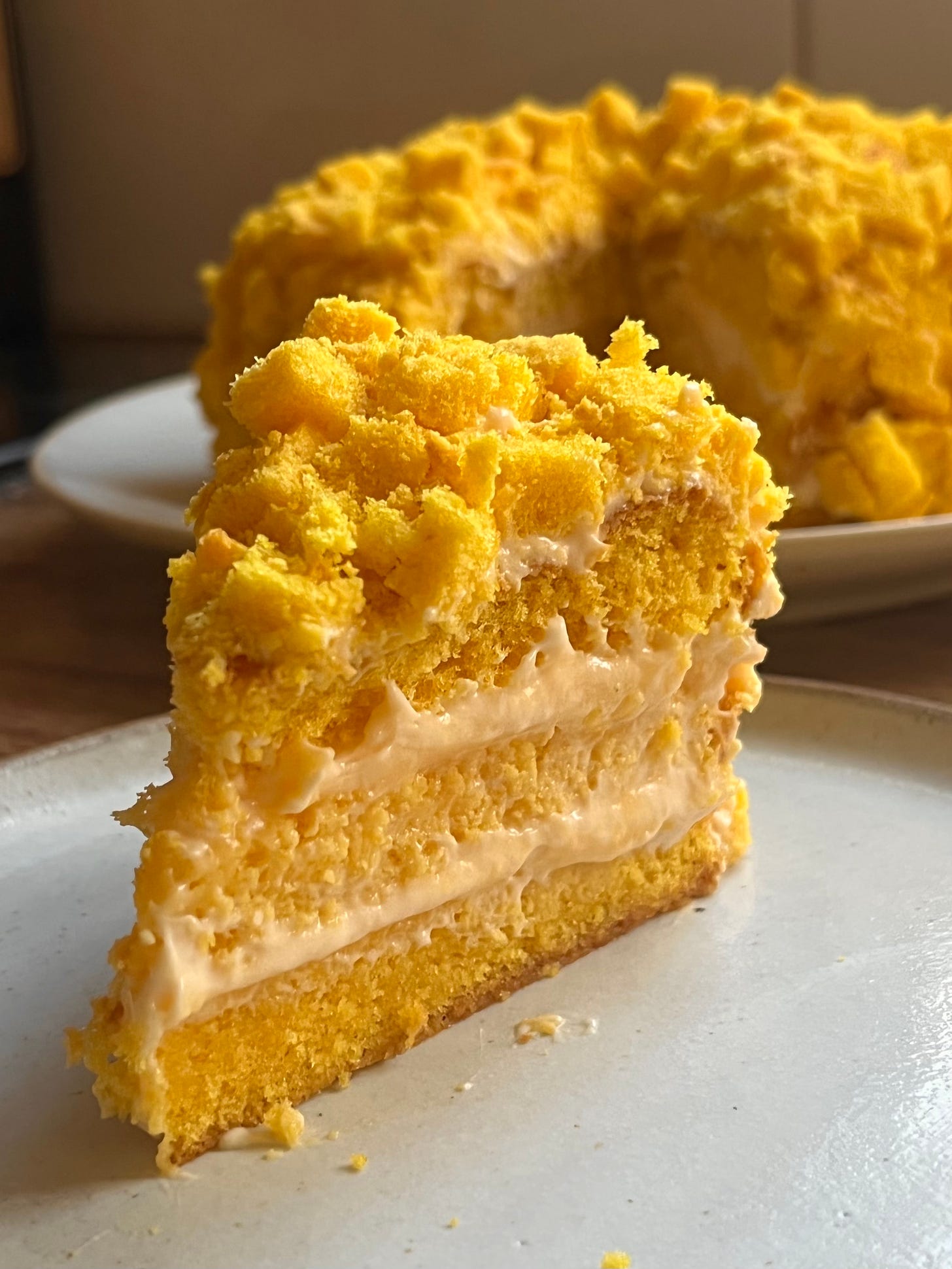
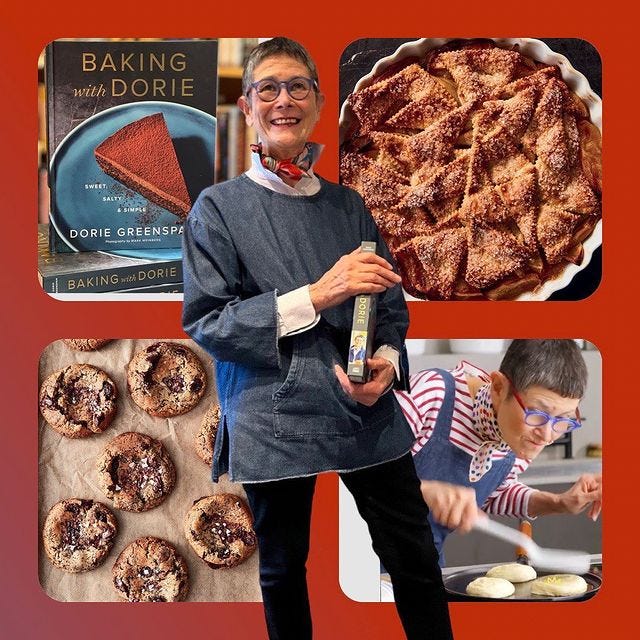
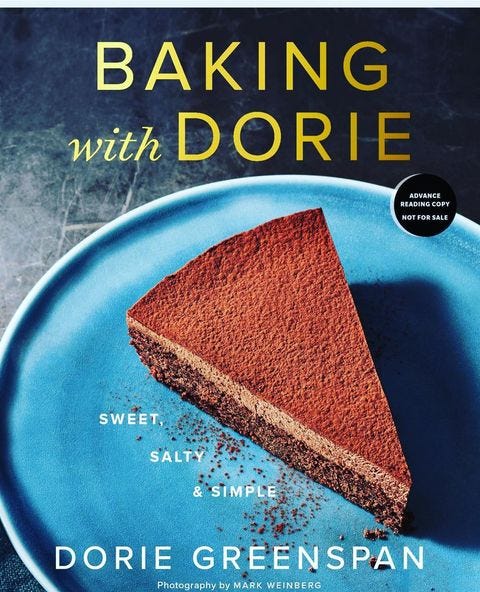
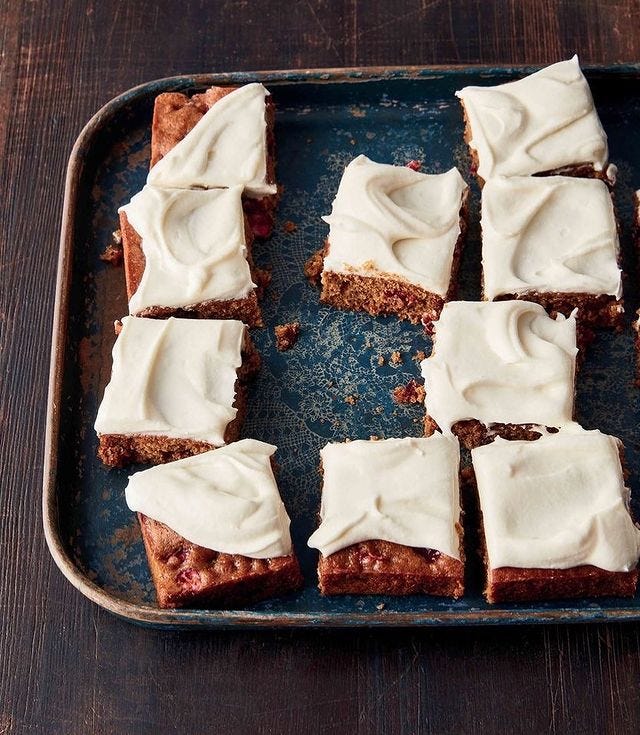


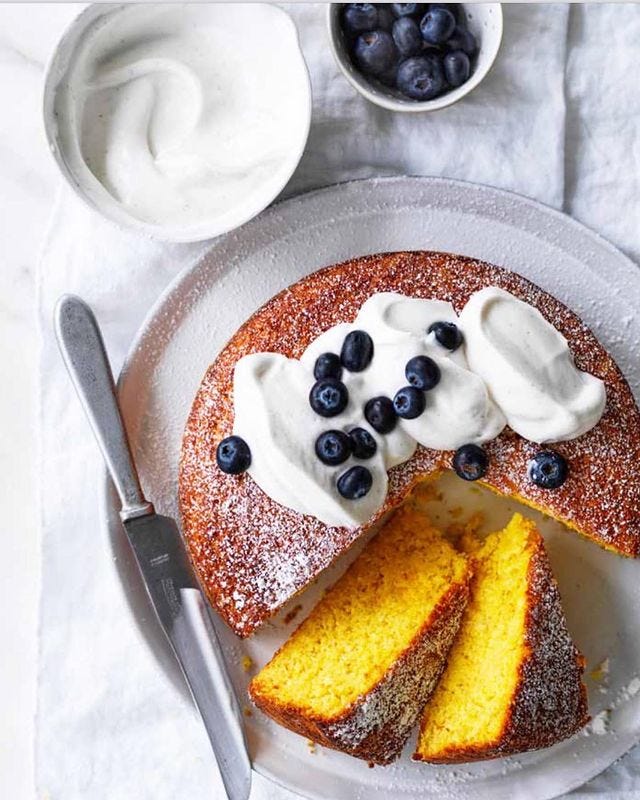

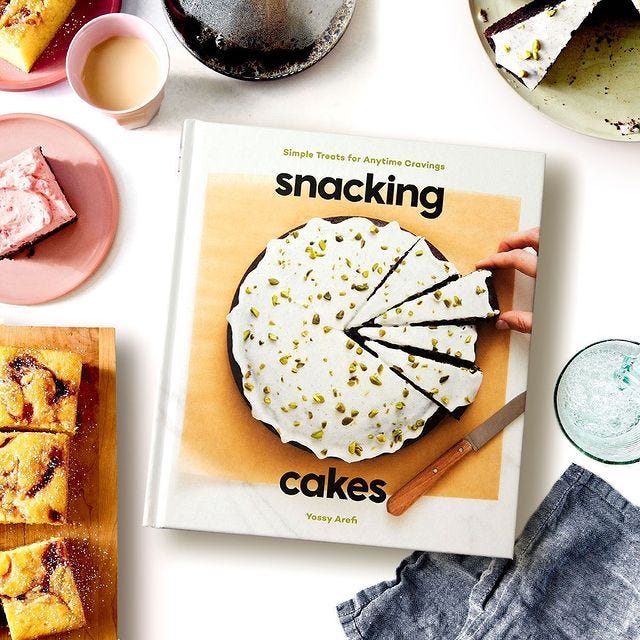
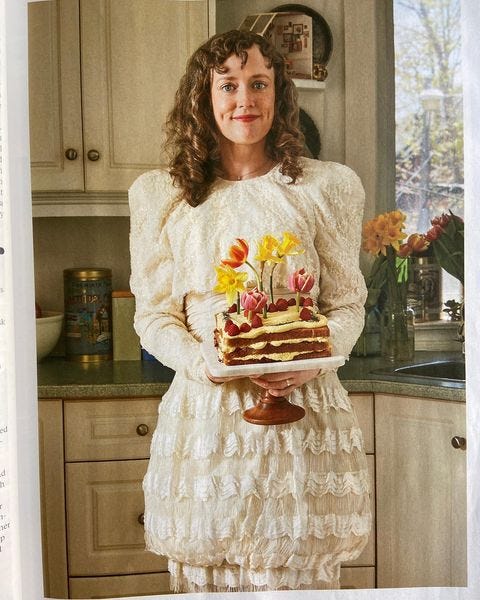
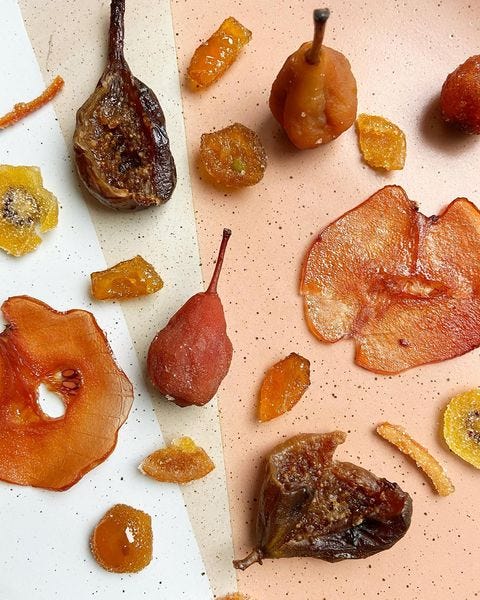
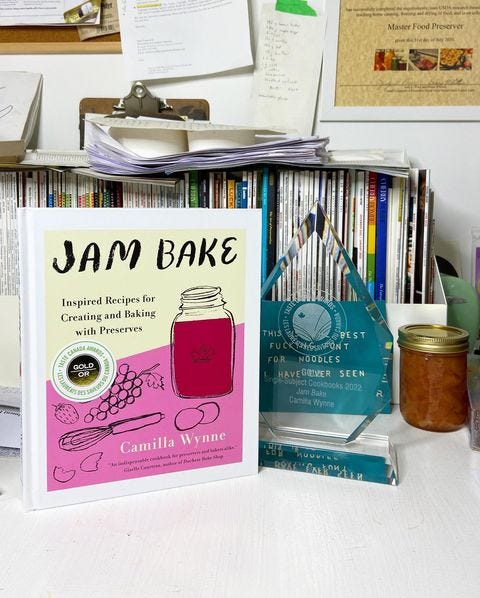

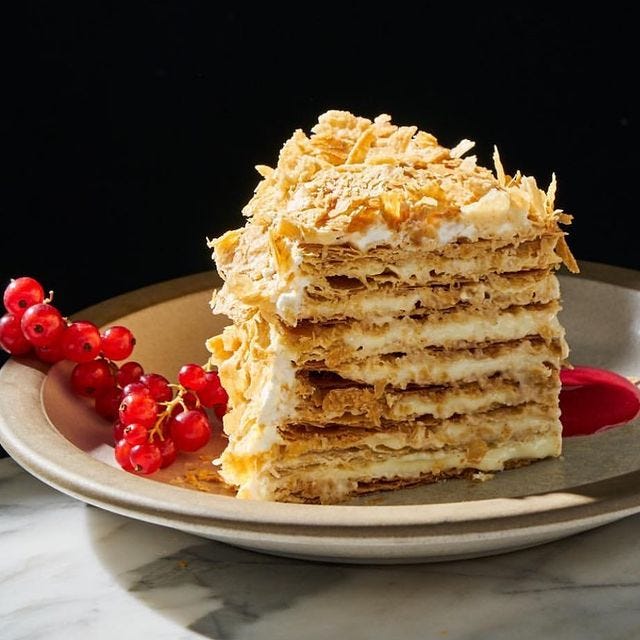

Liz Prueitt gets it!!! The world needs to use scales!!! ❤️❤️❤️
I have two of these books, Simple and Tartine.
Absolutely loved reading the interviews with such amazing women for IWD. Thank you Nicola 😊